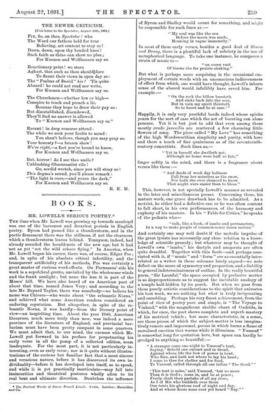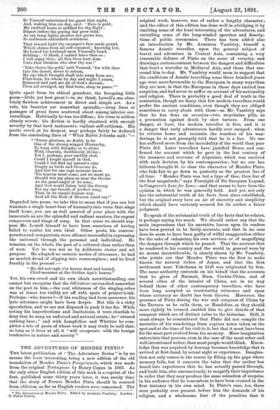BOOKS.
MR. LOWELL'S SERIOUS POETRY.*
THE time when Mr. Lowell was growing.up towards manhood was one of the barrenest and dreariest periods in English poetry. Byron had passed like a thunderstorm, and in the poetic firmament there was the stillness, if not the clearness, which a thunderstorm leaves behind. Tennyson, indeed, had already sounded the herald-note of the new age, but it had not as yet "set the wild echoes flying." In America, when Mr. Lowell began his career, there was, of course, Edgar Poe ; and, in spite of his absolute ethical infertility, and the transparent artificiality of his methods, Poe was certainly a great master of curious word-effects. On Parnassus' side his work is a sepulchral grotto, unvisited by the wholesome winds and the frank sunlight ; but none the less it is part of the Muses' hill. We have also heard of an American poet of about that time, named Jones Very ; and according to the late Mr. Bayard Taylor, there was somebody—we believe his name was Chivers—who wrote about " the reboantic Norns," and achieved what some American readers considered an enduring reputation. But altogether, in spite of the re- boantic Norns, it was hardly—from the literary point of view—an inspiriting time. About the year 1840, American literature, much more truly than now, was indeed a mere province of the literature of England, and provincial bar- barism must have been pretty rampant in some quarters. We must admit that, to our mind, the excuses which Mr. Lowell put forward in his preface for perpetuating his early verse in all the pomp of a collected edition, seem inadequate. For the most part, it is not particularly in- teresting, even as early verse; nor is it quite without illustra- trations of the curious but familiar fact that a most sincere and veracious nature, before it has discovered its own in- dividuality—before it has developed into itself, so to speak, and while it is yet practically inarticulate—may fall into insincerities and theatrical postures wholly alien to its real bent and ultimate direction. Doubtless the influence • The Poetical Works of James Russell Lovell. 3 vols. London : Macmillan and Co.
of Byron and Shelley would count for something, and might be responsible for such lines as :-
" My soul was like the sea
Before the moon was made.
Moaning in vague immensity."
In most of these early verses, besides a good deal of Sturm, and Drang, there is a plentiful lack of sobriety in the use of metaphorical language. To take one instance, he compares a strain of music to—
"an ocean vast Of bisons the far prairie shaking."
But what is perhaps more surprising is the occasional em- ployment of certain words with an unconscious ludicrousness of effect from which, one would have thought, Lowell's inborn sense of the absurd would infallibly have saved him. For example :— " On the rock the billow bursteth And sinks back into the seas, But in vain my spirit thirsteth So to burst and be at ease !"
Happily, it is only very youthful bards indeed whose spirits yearn for the sort of ease which the act of bursting can alone procure. Yet it is but just to add that even among these mostly crude juvenilia are scattered a few charming little flowers of song. The piece called "My Love " has something of the high Wordsworthian simplicity and purity, with here- and there a touch of fine quaintness as of the seventeenth- century concettists. Such lines as,-
" Yet in herself she dwelleth not, Although no home were half so fair," linger softly in the mind, and there is a fragrance about verses like these :— " And deeds of week day holiness Fall from her noiseless as the snow, Nor hath she ever chanced to know That aught were easier than to bless."
This, however, is not specially Lowell's manner as revealed in the later and miscellaneous poems. Concerning these, his mature work, one grave drawback has to be admitted. As a metrist, he either had a defective ear, or he was often content to fall short, in his own performances, of the harmony and euphony of his masters. In his " Fable for Critics," he speaks of the pedants who- " talk, like a book, of iambs and pentameters, In a way to make people of common-sense damn metres." And certainly one may well doubt if the melodic impulse of the great lyrists has necessarily any close relation to a know- ledge of scientific prosody; but whatever may be thought of Lowell's own "iambs," his dactyls and anapaests are often quite dreadful. Together with this fault—and perhaps asso- ciated with it, if " music " and "form " are as essentially inter-. related as a writer in these columns lately argued—we note defect on the score of symmetry and proportion, and a liability to general indeterminateness of outline. In the really beautiful poem, " Sir Launfal," the space occupied by prelusive matter is so disproportionate as to suggest the inevitable analogy of a temple half-hidden by its porch. But when we pass from these purely artistic considerations to the spirit that animates his best work, we see nothing but what is truly invigorating and ennobling. Perhaps his very finest achievement, from the point of view of poetry pure and simple, is " The Voyage to. Vinland," with the magnificent skaldic chant of Gndrida, in which, for once, the poet shows complete and superb mastery of his metrical vehicle ; but more characteristic, in a sense, are those pieces of which the subject-matter is less imagina- tively remote and impersonal, poems in which burns a flame of moralised emotion that warms while it illumines. " Yussouf is somewhat long for quotation here, but space can hardly be grudged to anything so beautiful:- " A stranger came one night to Yussouf's tent, Against whose life the bow of power is bent, Who flies, and hath not where to lay his head ;
Saying, Behold one outcast and in dread,
I come to thee for shelter and for food, To Yussouf, called through all our tribes " The Good." ' This tent is mine,' said Yussouf, 'but no more Than it is God's; come in, and be at peace ; Freely shalt thou partake of all my store, As I of His who buildeth over these Our tents his glorious roof of night and day, And at whose doors none ever yet heard "Nay."'
So Yussouf entertained his guest that night, And, waking him ere day, said : Here is gold; My swiftest horse is saddled for thy flight ; Depart before the prying day grow bold.' As one lamp lights another nor grows less, So nobleness enkindleth nobleness.
That inward light the stranger's face made grand, Which shines from all self-conquest ; kneeling low, He bowed his forehead upon Yussours hand, Sobbing : 0 Sheik, I cannot leave thee so ; I will repay thee ; all this thou bast done Unto that Ibrahim who slew thy son !'
' Take thrice the gold,' said Yussouf, 'for with thee Into the desert, never to return, My one black thought shall ride away from me; First-born, for whom by day and night I yearn, Balanced and just are all of God's decrees ; Thou art avenged, my first-born, sleep in peace.'"
Quite apart from its ethical grandeur, the foregoing little poem—little, yet how great !—is, we think, Lowell's one abso- lutely flawless achievement in direct and simple art. As a rule, his beauties are somewhat sporadic,—stray lines or
passages of great force scattered about among inferior sur- roundings. Habitually he was too diffuse ; his verse is seldom thisely woven; his diction is hardly chastised with enough severity by that hard taskmaster, vigilant self-criticism. His poetic creed, at its deepest, may perhaps fairly be deduced from the concluding lines of " What Rabbi Jehosha said : "—
" 'Twere glorious, no doubt, to be One of the strong-winged Hierarchy, To burn with Seraphs, or to shine With Cherubs, deathlessly divine ; Yet I, perhaps, poor earthly clod, Could I forget myself in God, Could I but find my nature's clue Simply as birds and blossoms do, And but for one rapt moment know 'Tis heaven must come, not we must go, Should win my place as near the throne As the pearl-angel of its zone, And God would listen 'mid the throng For my one breath of perfect song, That, in its simple human way, Said all the Host of Heaven could say."
Degraded into prose, we take this to mean that if you can but translate a single heart-beat of humanity into verse that sings itself home, you are as well assured of your place with the immortals as are the splendid and radiant masters, the august conquerors and kings of song. In that sense we should sup- pose Mr. Lowell himself to have been conscious of having failed to realise his own ideal. Other poets, his contem- poraries and compatriots, were oftener successful in expressing the universal through the personal and individual. He remains, on the whole, the poet of a cultured class rather than of man. Yet he was not so by deliberate choice and set purpose. He adopted no esoteric modes of utterance; be had no morbid dread of slipping into commonplace ; and he lived frankly in the present :— " He did not sigh o'er heroes dead and buried, Chief-mourner at the Golden Age's hearse."
Yet, his own creed and his own ideals notwithstanding, one cannot but recognise that the littirateur encroached somewhat
on the poet in him,—the real whiteness of the singing-robes was at times too visibly set off with spots of printer's-ink. Perhaps—who knows P—if his reading had been narrower, his lyric utterance might have been deeper. But this is a risky speculation, and we are not disposed to push it too far. While noting his imperfections and limitations, it were churlish to deny that he sang an unforced and natural strain; he" uttered nothing base ; " and with Longfellow and Whittier he com- pletes a trio of poets of whose work it may truly be said that, so long as it lives at all, it "will co-operate with the benign tendencies in nature and society."



































 Previous page
Previous page